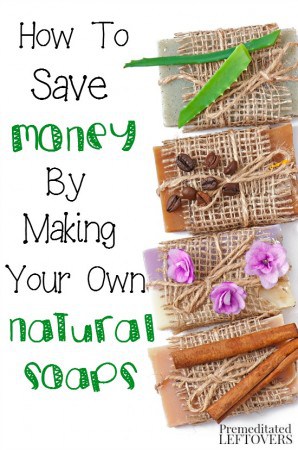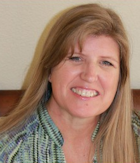I have a weird “thing” for those beautiful hand-crafted soaps you see at craft fairs, farmer’s markets and street swap meets. I love the look of them and the beautiful scents. I love the idea of them being made by someone’s hands and not in some factory. Then, I always get scared by the sticker price. Usually it is 5-6 times more than cheaper soaps sold at big box retailers and dollar stores. While most of these enticing soaps are natural and the ones at the big box store obviously have chemicals, I still can’t bring myself to spend that much on a single bar of soap. If you are finding that you are seeing the same thing, have you ever wondered if it would be cheaper to make yourself? Here are some tips if you are hoping to get into soap making and what the cost breakdown might be.
How to Save Money By Making Your Own Natural Soap
Make sure you are not comparing apples to oranges. When it comes to breaking down cost of making natural soaps, you have to be comparing it to the cost of other natural soaps like those I mentioned above, not the cheapie bars you can get that are at the dollar store.
Understand the three basic parts of the soap making process. Anything else you add is purely cosmetic appeal or to add extra benefits. These three ingredients are a natural oil (such as from plants or animals), water and Lye. With these three ingredients, you have soap.
Join your local soap-making guild (yes, such things exist!) so you can have resources, friends who have the same hobby as you, and sometimes even meetings where you can learn more about the soap making process.
Buy your ingredients wholesale. It might leave you paying out a large chunk at first, but in the end, you will have saved more money. Some places to check for wholesale prices are Amazon, local farmers and online retailers of soap making supplies.
Adding scent with essential oils can be one of the more expensive parts of the soap making process. There are several ways to get plant based essential oils for much cheaper than you think. One of my favorite ways to save money on essential oils is to make them myself. Essentially, all you do is place fragrant plants pieces like flowers and leaves and then leave them in oil for 24 hours. Strain the mixture and add new flowers or leaves. Do this over the course of a week or two and you have essential oil.
Purchasing lye can be tricky, especially if you are trying to save money. No longer can you go to the grocery store and buy it. You can sometimes find lye at hardware stores, even the big box chains like Lowes and Home Depot. The best place to look for it in these stores is in the drain cleaners. Just make sure it is 100% Lye or it will not work. Another way to save money on lye is to buy it in bulk. This is where your friends at the soap-making guild can come in handy. You could all purchase a 50 lb bag of it and split it. Just make sure you can store that much lye away from pets and children.
The bottom line to saving money with the soap making process is to not just make a bar here and there, but rather, large batches and buying ingredients in bulk. You will save money on natural soap if you make it yourself and you can feel good about having them clean with it.
Do you make soap? What tips would you give to someone who was just starting out?
More Homemade Hair and Body Products
How to Make Homemade Lavender Rosemary Shampoo
How to Make Your Own Hair Products


Robin says
Love it, Christine! I own a fair trade, organic body care company and have been making soap for the last 5 or 6 years. My biggest tip to someone just starting out is to buy a good digital scale. Mine measures down to an eighth of an ounce. Measurements have to be exact, or you will either have a lye-heavy soap, or an oily soap. Always run new recipes through a lye calculator before you use them. I use Brambleberry’s. It’s here: http://www.brambleberry.com/pages/Lye-Calculator.aspx
Also, take seriously the warnings about wearing rubber gloves and eye protection, along with long sleeves.
With these safe guards, I’ve never had a batch of soap seize or separate (I’ve made hundreds), and I’ve never had a lye burn.